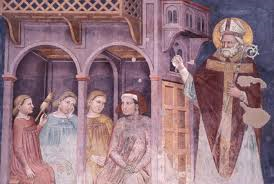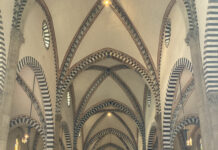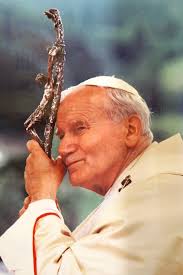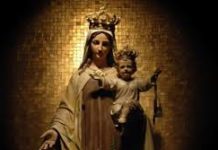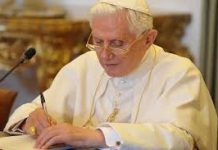The story of St Nicholas goes back to the third century, to the 15th March 270, when he was born in the Patara village in Asia Minor. In those days his village was within Greek influence. He hailed from wealthy parents, who were adamant to raise him in the Christian faith. Unfortunately he lost his parents when still a small boy, but his ardent faith and complete trust in Jesus made Nicholas obey to the letter Jesus’ words to sell what you own and give the money to the poor. The brave Nicholas was strong enough to utilise his inheritance in favour of the poor, the sick and those who were suffering. The more he gave himself to others, the more he felt drawn to offer his life to serve Jesus in the vulnerable. Seeing his great heart for his neighbour the people chose him to be their Bishop, and it was by popular acclamation that Nicholas was consecrated Bishop of Myra as a youth. His closeness to the suffering continued – How many children, sick, destitute and even mariners benefited from his outstanding generosity! As a matter of fact the third Ikos of the third Kontakion calls Nicholas a superb pilot of those upon the high seas.
When Diocletian became Roman Emperor. Christians were unjustly and cruelly persecuted. Even Bishop Nicholas did not escape such harsh and injustice treatment. His life story tells us that he suffered imprisonment and exile because he never wavered in his faith. As time went on and Nicholas was finally liberated it is believed that he attended the Council of Nicea in AD 325. The Akathist dedicated to St Nicholas the Wonderworker in his second Ikos of the second Kontakion alludes to this fact when it says: Teaching incomprehensible knowledge about the Holy Trinity, you were with the holy fathers in Nicaea a champion of the confession of the True Faith. You confessed the Son equal of the Father, co-everlasting and co-enthroned, and you convicted the foolish Arius.
It was on December 6 of 343, in Myra where he was Bishop that Nicholas breathed his last. He was buried in his cathedral, where a special relic, named manna, formed in his grave. From this liquid substance many people were healed. In the second Ikos of the second Kontakion we find written: Seeing the effusion of your myrrh, our souls and bodies are enlightened. We recognize you to be a wonderful living source of unction, O divinely wise Saint Nicholas. Miracles like water pour out through the grace of God, when you mercifully fill them that faithfully cry out to Him: Alleluia.
This contributed greatly to the spread of his devotion, his feast celebrated on this, the day of his death. (The older Julian Calendar has the feast on December 19).
Besides the numerous stories and legends which show his outstanding spirit, there is also the Akathist to St Nicholas the Wonderworker, which we have already mentioned, that beautifully informs us about why the Church saw in him as a formidable protector and helper of the needy.
The Akathist identifies Nicholas with hav[ing] boldness toward the Lord. In the first Ikos of the first Kontakion, Nicholas is the one who was purified from [his] mother’s womb; amazed [his] parents by [his] birth; manifested power of soul immediately after birth; plant of the Promised Land; flower of divine planting; virtuous vine of Christ’s vineyard; wonderworking tree of the Paradise of Jesus; lily of heavenly growth; and myrrh of the fragrance of Christ.
The second Ikos of the second Kontakion presents Nicholas as the sanctuary of prayer and devotion; beautiful city of refuge for the faithful; unfailing stronghold of the True Faith; wondrous praise of the Holy Trinity; preach[ed] the Son of equal honor with the Father; expel[led] the demonic Arius from the council of the saints; father, [he was] the splendor of the fathers; wise goodness of all the divinely wise; [who] uttered golden words; who guide[d] so well [his] flock; through [him] faith is strengthened; and through [him] heresy is overthrown.
In the third Ikos of the third Kontakion the Byzantine liturgy continues to unravel to us God’s abundant grace in St Nicholas. In fact, he is portrayed as holy purification of mortals; container of great virtues; pure and honorable abode of holiness; all-luminous lamp, beloved by all; light golden-rayed and blameless; worthy converser with angels; good guide of men; treasury of spiritual fortunes; seeker of those in need; through [Nicholas] we are delivered from bodily passions; and through [Nicholas] we are filled with spiritual delights.
In the fourth Ikos of the fourth Kontakion Nicholas emerges as servant in God’s grace; dispeller of unexpected evils; planter of good desires; compassionate father of those in misfortune; dread punisher of wrongdoers; abyss of miracles poured out by God; tablets of the Law of Christ written by God; strong uplifting of the fallen; support of them that stand aright and through [Nicholas] all deception is exposed; and through [Nicholas] all truth is realized.
In the fifth Ikos of the fifth Kontakion, this Great Wonderworker is bestower of blessings upon the humble; worker of miracles for the destitute; consolation of those that flee to [Nicholas’] aid; inexhaustible bread of the hungry; God-given wealth of those living in poverty on earth; speedy uplifting of paupers; quick hearing of the needy; acceptable care of the sorrowful; blameless provider for the three maidens; replenishment of their aged father; fervent guardian of purity; and delight of all the helpless.
In the sixth Ikos of the sixth Kontakion, the good shepherd Nicholas is the one who deliver[s] from unjust death; who preserve[s] from false accusation; who destroy[s] the counsels of the unrighteous; who tear[s] lies to shreds like cobwebs; who gloriously exalt truth; release of the innocent from their fetters; revival of the dead; revealer of righteousness; exposer of unrighteousness; through [Nicholas] the innocent were saved from the sword; and through [Nicholas] they enjoyed the light.
In the seventh Ikos of the seventh Kontakion the truly fragrant and mystical myrrh, Saint Nicholas, by shepherding the people of Myra in holiness, is a new Noah, a guide of the ark of salvation; calm harbor of the storm-tossed; sure preservation of those that are drowning; good pilot of those that sail upon the deeps; strong ruler of the raging of the sea; guidance of those in whirlwinds; warmth of those in frosts; radiance dispersing the gloom of sorrow; light illumining all the ends of the earth; one who deliver[s] people from the abyss of sin; who cast[s] Satan into the abyss of hades; through [Nicholas] we boldly invoke the abyss of God’s compassion; through [Nicholas] we are rescued from the flood of wrath and we find peace with God.
In the eighth Ikos of the eighth Kontakion there is the characterisation of the glorious Nicholas, truly a helper out to all, God-bearing Nicholas, who gathered together all that flee to [his] aid: source of all kinds of healing; helper of those that undergo cruel suffering; dawn shining for prodigals in the night of sin; Heaven-sent dew for those in the heat of labors; he give[s] prosperity out to those that need it; prepare[s] an abundance for those that ask; often fulfil[s] requests; restore[s] strength out to the aged and gray-headed; prosecutor of many who have strayed from the True Way; faithful steward of the mysteries of God; through [Nicholas] we conquer envy; and through [Nicholas] we lead a charitable life.
In the ninth Ikos of the ninth Kontakion St Nicholas is our great intercessor — dispensing gracious healings, delighting our souls, and gladdening the hearts of all that fervently pray to [him]. The divinely wise Father Nicholas, who strengthened us in our faith, is proclaimer of truth and discloser of light; confessor of Christ before all people; teacher of the Divine Commandments; destroyer of impious doctrines; ladder set up by God, by whom we ascend to Heaven; God-given protection, by whom many are sheltered; who make[s] wise the unwise by [his] sayings; who move[s] the slothful by [his] example; inextinguishable brightness of God’s Commandments; most luminous ray of the Lord’s statutes; through [his] teaching the heads of heretics are hammered; and through [Nicholas] the faithful are counted worthy of glory.
In the tenth Ikos of the tenth Kontakion, the most blessed Nicholas, free[s] also us who are poor in virtue from pride, temptation, illness, and needs of various kinds, because he rescue[s] from eternal wretchedness; bestow[s] incorruptible riches; imperishable food for those that hunger after righteousness; inexhaustible drink for those that thirst for life; preserve[s] from revolution and war; frees[] us from chains and imprisonment; most glorious intercessor in misfortunes; strong guardian in temptations; snatched many from destruction; kept countless numbers unharmed; through [Nicholas] sinners escape a frightful death; and through [Nicholas] those that repent obtain eternal life.
In the eleventh Ikos of the eleventh Kontakion, the God-chosen Father Nicholas, through much searching [he] explain[s] the precepts of the True Faith, guiding us to sing with faith, hope and love out to the One God in Trinity. Thus, he speak[s] and concerning the uncreated light of the Trinity, [he] enlighten[s] the souls of the faithful. This is so because Nicholas is the radiance of the Three-Sunned Light; daystar of the never-setting Sun; lamp kindled by the divine flame; destruction of the demonic flame of impiety; bright preaching of the True Faith; luminous radiance of the light of the Gospel; lightning who consumes heresy; thunder who terrifies tempters; by [his] teachings we gain true knowledge; by [his] deeds we acquire understanding; through [him] the worship of creatures hath been abolished; and through [him] we have learnt to worship the Creator in the Trinity.
Concerning the twelfth Ikos of the twelfth Kontakion, the divinely wise Father Nicholas, who in him God Who is glorified in the Trinity is wondrously glorified, is presented as servant of the King of kings and Lord of lords; co-dweller with His heavenly servants; patron of devout rulers. praise of pious Christians; namesake of victory; triumphant follower of the True Way; mirror of all the virtues; attentive helper of all who confide in [him]; after God and the Theotokos, all our hope; health of our bodies and salvation of our souls; through [him] we are delivered from eternal death; and through [him] we are deemed worthy of everlasting life.
St Nicholas responded magnificently to God’s grace and managed to live these virtues which the Akathist speaks about. In so doing he powerfully lived what St Augustine tells in his Treatise on John which we read in the second reading of the office of readings when commemorating St Nicholas’ liturgical memory, namely that the strength of love ought to overcome the fear of death.
When the Lord asks Peter if he loves him, he is asking something he already knows. Yet he does not ask only once, but a second and third time. Each time Peter’s answer is the same: You know I love you. Each time the Lord gives him the same command: Tend my sheep.
Peter had denied Christ three times, and to counter this he must profess his faith three times. Otherwise his tongue would seem quicker to serve fear than love, and the threat of death would seem to have made him more eloquent than did the presence of life. If denying the shepherd was proof of fear, then the task of love is to tend his flock.
When those who are tending Christ’s flock wish that the sheep were theirs rather than his, they stand convicted of loving themselves, not Christ. And the Lord’s words are a repeated admonition to them and to all who, as Paul writes sadly, are seeking their own ends, not Christ’s.
Do you love me? Tend my sheep. Surely this means: “If you love me, your thoughts must focus on taking care of my sheep, not taking care of yourself. You must tend them as mine, not as yours; seek in them my glory, not yours; my sovereign rights, not yours; my gain, not yours. Otherwise you will find yourself among those who belong to the ‘times of peril,’ those who are guilty of self-love and the other sins that go with that beginning of evils.”
So the shepherds of Christ’s flock must never indulge in self-love; if they do they will be tending the sheep not as Christ’s but as their own. And of all vices this is the one that the shepherds must guard against most earnestly; seeking their own purposes instead of Christ’s, furthering their own desires by means of those persons for whom Christ shed his blood.
The love of Christ ought to reach such a spiritual pitch in his shepherds that it overcomes the natural fear of death which makes us shrink from the thought of dying even though we desire to live with Christ. However distressful death may be, the strength of love ought to master the distress. I mean the love we have for Christ who, although he is our life, consented to suffer death for our sake.
Consider this: if death held little or no distress for us, the glory of martyrdom would be less. But if the Good Shepherd, who laid down his life for his sheep, has made so many of those same sheep martyrs and witnesses for him, then how much more ought Christ’s shepherds fight for the truth even to death and to shed their blood in opposing sin? After all, the Lord has entrusted them with tending his flock and with teaching and guiding his lambs.
With his passion for their example, Christ’s shepherds are most certainly bound to cling to the pattern of his suffering, since even the lambs have so often followed that pattern of the Chief Shepherd in whose one flock the shepherds themselves are lambs. For the Good Shepherd who suffered for all mankind has made all mankind his lambs, since in order to suffer for them all he made himself a lamb.
Let us prayer to St Nicholas the prayer with which we conclude his Akathist:
Saint Nicholas, you are a wondrous helper of all unfortunate people – the poor and the sorrowful, the young and the old, the fallen and the dispossessed, those who journey afar and those who are homebound with illnesses. Count us among the multitudes which entreat your compassion, and nurture us with the bread of your mercy. Though we are many, you know the very heart of each one of us and you know our needs. Deliver us, Saint Nicholas, from all things that lead out to death, and bless us with all things that please God. Since you are a tireless worker of wonders, teach us to be repentant prodigals and fruitful vines for Christ our Lord and Master. We thank you for your bountiful nourishment and provision. Amen. Through the prayers of our Holy Fathers, Lord Jesus Christ our God, have mercy on us and save us! Amen!

